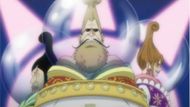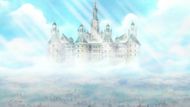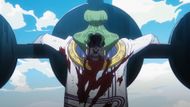One Piece showcases aristocratic tyranny through its most reviled characters, who treat human slavery as entertainment. These self-proclaimed gods walk among mortals while demanding absolute submission from every breathing soul they encounter. Their glass helmets symbolize their detachment from the very air that common people breathe, believing themselves too pure for contamination.
The Celestial Dragons represent the World Government's founding bloodlines, who seized global dominion eight centuries ago. Officially called World Nobles, these elite figures descend from the families that wiped out the Great Kingdom during the Void Century, making them virtually untouchable. Their descendants now rule from Mariejois, exercising supreme authority over all nations while maintaining their status through inherited divine privilege.
Eight centuries ago, twenty royal families united to overthrow the mysterious Great Kingdom in what became known as the Void Century. This alliance in the One Piece series fundamentally reshaped the world's political structure through military conquest and strategic collaboration.

Nineteen of these families ascended to the holy land of Mariejois, establishing themselves as the ruling elite. The Nefertari family, the twentieth of the ruling clans, decided to stay in Alabasta instead of ascending to god-like status with the other Celestial Dragons.
This origin story in One Piece is the root of the Celestial Dragons' belief in their own superiority. Their ancestors' victory over the Great Kingdom granted them privileges that transcend normal societal boundaries. The world government system they created serves their interests above all others, making them untouchable within the established legal framework.
As the world’s top social class, Celestial Dragons embody the corruption and double standards at the heart of the global government. Their wealth and status place them beyond conventional laws and moral constraints. Common citizens must kneel in their presence, and any perceived slight against them triggers immediate retaliation from Marine Admirals.
Their role in the One Piece series

Celestial Dragons function as both direct and indirect antagonists throughout One Piece's narrative structure. Their actions create the conditions that drive many character motivations and story conflicts. The slavery system they perpetuate affects numerous characters' backgrounds, while their political control enables other villainous organizations to operate.
These characters maintain essential importance to the series' overarching narrative themes. Their presence forces protagonists to confront systematic injustice rather than simply defeating individual villains. One Piece uses their corruption to explore themes of inherited privilege, systematic oppression, and the need for revolutionary change in established power structures.
Not all Celestial Dragons possess identical levels of influence or personal capability. Their unpredictable nature and whimsical behavior make them particularly dangerous individuals who always achieve their desires through authority. Some focus on hedonistic pursuits, while others actively participate in governmental affairs or military operations.

The series introduces various World Nobles with distinct personalities and power levels. Some demonstrate combat abilities or strategic intelligence, while others rely entirely on their inherited status. This diversity prevents One Piece from portraying them as a monolithic group, though their shared corruption remains consistent.
The Celestial Dragons embody everything wrong with the One Piece world's power structures. Their inherited authority, combined with complete moral bankruptcy, creates the systematic oppression that drives the series' central conflicts.
In short, their influence permeates every aspect of the One Piece world, from individual character backstories to major political events. As descendants of the original World Government founders, they represent both historical injustice and ongoing systematic abuse.
